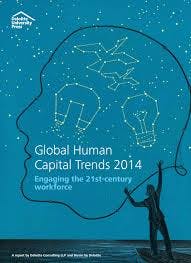Deloitte’s annual Global Human Capital Trends Report for 2014 is out.
Influenced by the work of Bersin by Deloitte, it examines 12 trends that represent the way employees today are driving their organizations to innovate and transform human capital practices.
The report, Global Human Capital Trends 2014: Engaging the 21st Century Worker, surveyed 2,532 business and HR leaders in 94 countries around the world over several months, also drawing upon past research on global business challenges in HR, leadership, and talent management.
The result of the report is a wealth of data on human capital strategies in the 21st century workplace that can be examined for perspective and insight into our own organizations and strategies.
A need to “re-skill” HR teams
The year’s 12 critical human capital trends were categorized into three broad categories. “Transform and Reinvent” examines the need to re-skill HR teams, capitalize on cloud based HR tech, implement HR analytics as a means to achieving business goals, and create a global HR platform that is robust and flexible enough to adapt to local needs.
So, re-skilling HR teams. Really? Why is this a critical trend?
According to the report, less than 8 percent of HR leaders have confidence that their teams have the skills needed to meet the challenge of today’s global environment, and consistently deliver innovative programs that drive business impact.
Business leaders unfortunately corroborate this statistic, with 42 percent believing that their HR teams are “underperforming” or “just getting by.” This is compared to the 27 percent of business professionals who rate HR as excellent or good when assessing HR and talent programs.
At a time when CEO’s are reporting human capital strategies as one of the top priorities for growth, it’s important that HR departments have the skills necessary to acquire, develop, and retain top talent as well as engage employees at all levels. And with a workforce that is increasingly global, tech-savvy, highly connected and demanding, HR departments face the challenge of doing all of this with increasingly creative strategies that meet the needs of this 21st century workforce.
A gap in business and HR perceptions
While such skills are highly necessary, the statistics indicate that HR departments are not as equipped with them as organizations would like.
Of further interest, Deloitte’s report discusses how many organizations are reporting seeing a “disruption” of the Chief Human Resource Officer (CHRO) role in their organizations. This disruption consists of a refocusing HR as a “business contribution” function with deeper skills in data/analytics as well as MBA-level business capabilities.
When it comes to organizations’ readiness to respond to the 12 global human capital trends, there is a discrepancy between business professionals’ and HR professionals’ perceptions.
For the five most urgent trends identified (leadership, re-skilling HR, global HR and talent management, retention and engagement, and talent and HR analytics) business executives report that their companies are less ready to address these issues than HR leaders report. For the issue of re-skilling HR, 48 percent of business respondents reported that HR is “not ready,” compared to 36 percent of HR respondents.
Deloitte’s report links this perceived lack of HR skills to some basic attributes, such as the fact that many organizations do not invest in developing the business skills of their HR teams and to the fact that more than 70 percent of all HR professionals enter the field without a specific degree or certification in business or human resources.
The data clearly shows what needs to be fixed
Of respondents surveyed from Deloitte’s report, 43 percent stated that their companies are “weak” when it comes to providing HR with appropriate training and experiences.
While disappointing, data like this is great because it clearly identifies perceived areas of weakness, and allows organizations to challenge their own programs and strategies for HR, as well as drawing conclusions more specific to their organization and strategies for transforming, reinventing, and re-skilling the HR team.
The bad news? Business leaders think that HR isn’t up to the people challenges of the 21st century.
The good news? Now we know, and can get to work!
This originally appeared on China Gorman’s blog at ChinaGorman.com.
